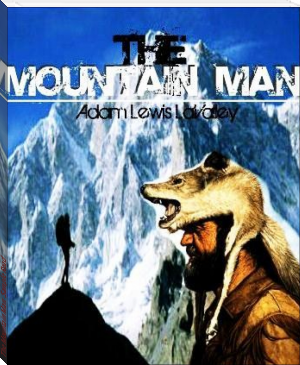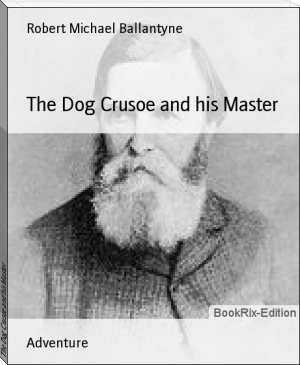The Rover of the Andes - Robert Michael Ballantyne (i have read the book txt) 📗

- Author: Robert Michael Ballantyne
Book online «The Rover of the Andes - Robert Michael Ballantyne (i have read the book txt) 📗». Author Robert Michael Ballantyne
"I'm a pretty fair runner," continued Pedro, "but my friend is a better. He passed me like a deer. `Come on,' he cried, `you've no time to lose.' From which I knew he meant that the blackguards would cross the river in canoes and pursue me. He led me across a spit of jungle-land where the river took a sudden bend, and came out on the bank at the head of a long rapid. On reaching the bank he pulled out a small canoe which had been concealed there, and told me to jump in. `You'll have to run the rapid. It's not much of a chance, but it's your only one.' I squeezed his hand, thanked him hastily, and was soon paddling quickly with the current. In a few moments I heard my friend shouting with rage and brandishing his knife. He was acting, I knew. Looking back I saw that a number of men had joined him, and again the arrows began to drop around me, but I was soon beyond their reach and battling with the rapid.
"Well was it for me that I have been much used to canoeing, for the words of my friend, `It's not much of a chance,' were literally true. For some minutes I was whirled about by eddies and shoots in such a way that it seems to me now a miracle that I escaped being dashed to pieces several times. I forgot all about my pursuers, so great was the danger; but when at last I ran out of the lowest shoot into the water below the rapids, I saw, on looking back, that they were still following me along the banks. I was going faster, however, than they were, so I felt easier in my mind, till I saw them jump into several canoes and push off in chase. By that time I had more than a mile of start, and the sun was setting. `Now, Pedro,' said I to myself, `it's a fair race for your life; so bend your back to it, my boy.' I went on till it grew so dark that I could hardly see twenty yards ahead of me. Then I put ashore, hauled the canoe up among the reeds, climbed into a tree and went to sleep, for well I knew that it would be death both to them and me if we continued descending a stream like that in the dark.
"Well, I slept like a top, for I was dead beat; but two or three times I awoke with a tremendous start under the impression that I was falling. I've always found it so when obliged to spend the night in the branches of a tree. Did you ever sleep so, Senhor Armstrong?"
Lawrence confessed that he had never yet indulged in such bird-like repose.
"Well, it's not so difficult as you might think," continued Pedro, with a meditative gaze at the fire, "especially if you're very tired, hard pressed for time, and in some danger. Under these circumstances it's wonderful what a fellow can do to make the best of his opportunities. You find out, somehow, the securest way to twine your legs and arms in among the branches, and twist your feet and fingers into the forks and twigs--don't you know?"
Yes, Lawrence knew well; at least, if he did not know exactly, he had a powerful imagination!
"Well, then, long before daylight I was up and off, feeling my way as best I could in the first grey glimpses of dawn, so that I got a good start--at least I thought so; but soon I found my pursuers had also started early and were overhauling me; and no wonder, seeing that their canoes were large and well manned. I now felt that I had no chance of escaping by water, but I had by that time got into a part of the country with which I was well acquainted, and knew that if I could only reach a certain point before being caught, I might take to the bush and cross overland to my friend's hut here. That was early this morning. The only trouble I had was that my wound was beginning to give me considerable pain, and I felt losing strength for want of food. I had scarce time to cat, much less to search for food, they pressed me so hard. However, a man makes a hard struggle for life, so I tightened my belt, and set to work with such good will, that I was soon a long way ahead of them, and got out of sight at a place where the river takes a number of bends and is full of small islands. At last, about noon, I reached the desired point, paddled carefully in among the reeds, so as to prevent the savages seeing where I had landed, jumped ashore, hid the canoe, stepped out as hard as I could, and--here I am."
"But," exclaimed Lawrence, with some excitement, "if you left the Indians so recently, won't they be close on your heels?"
"No fear. I came here in a straight line overland. By the windings of the river they cannot be here, even at the soonest, before the afternoon of to-morrow. But they will probably give up the chase long before getting this length. Besides, if they did arrive, they would find a warm reception from four well-armed men, instead of catching one poor unarmed fugitive. But we won't give them the chance. We will be up and away by daybreak. Tiger here has agreed to join us in our trip to Buenos Ayres. He will take his wife and family down stream to his father-in-law's tribe, where they will be safe till his return. Are you all well, and ready for a start?"
"Yes, all well--and shall be ready as soon as you please."
"That's right. Where's Quashy?"
"Close alongside. Don't you hear him?"
Lawrence referred to a sound like the drone of a giant mosquito, which proceeded from the negro's nose, for that worthy was a heavy sleeper-- when not in danger--and had not been disturbed by the arrival of the guide.
Giving vent to a prolonged yawn, Pedro rose and stretched himself. Then he went up to the sleeping Quashy and took him by the nose, at the same time putting his hand on his mouth to smother the inevitable yell in its birth. When sufficiently awake to be released with safety, the amiable negro was permitted to raise himself, and when aware of who had grasped him, he beamed with good-will, and gleamed with surprise.
"Get up, Quashy, and help them to pack," said Pedro, curtly, "we start at daybreak."
Quashy was on his feet in a moment. "Don't rouse me till it's time to start," added Pedro, who thereupon rolled into the vacant hammock, and was asleep--perchance in the land of dreams--almost as soon as his wearied head reposed on the negro's pillow.
CHAPTER SIXTEEN.
TELLS OF ABSURD, AS WELL AS EVIL, DOINGS, AND WINDS UP WITH A HORRID SURPRISE.
Whether Pedro's pursuers continued the chase as far as the Indian hunter's hut we cannot tell, for long before noon of the following day our travellers were far from the hunting-grounds of the gallant savage.
Soon after the usual midday siesta, the canoe, which contained the whole of the hunter's worldly wealth, was run on the beach near to the spot where dwelt his father-in-law with many members of his tribe.
That worthy old man, in a light evening costume consisting of a cotton shirt and straw hat, came down to receive his children, who landed amid much noise with their boys and girls and household gods, including the red monkey, the parrot, the flamingo, the fat guinea-pig, the turtle, and the infant tapir. The old chief was quite willing to take care of the family during the absence of his son-in-law, and was very pressing in his offers of hospitality to the white travellers, but Pedro refused to delay more than an hour at the village.
The old man also evinced a considerable amount of curiosity in regard to Manuela, and made one or two attempts to engage her in conversation, but on being informed by Pedro that she belonged to a tribe living half-way between his hunting-grounds and the regions of Patagonia, and that she did not understand his dialect at all, he forbore to question her, and satisfied himself with simply gazing.
After a farewell which was wonderfully affectionate for savages, Spotted Tiger embarked in Pedro's canoe, and, pushing off into the river, bade the Indians adieu.
The canoe in which the party now travelled belonged to Tiger, and was larger as well as more commodious than that in which they had hitherto journeyed, having a gondola-like cabin constructed of grasses and palm-leaves, underneath which Manuela found shelter from the sun. In the evenings Pedro could lie at full length on the top of it and smoke his cigarette. They were floating with the current, you see, and did not require to labour much at the paddles at that time.
It would weary the reader were we to continue our description of the daily proceedings of our adventurers in journalistic form. To get on with our tale requires that we should advance by bounds, and even flights--not exactly of fancy, but over stretches of space and time, though now and then we may find it desirable to creep or even to stand still.
We request the reader to creep with us at present, and quietly listen while Pedro and Tiger talk.
Pedro lies extended on his back on the roof of the gondola-like cabin, his hands under his head, his knees elevated, and a cigarette in his mouth. Lawrence and Quashy are leaning in more or less lazy attitudes on the gunwale of the canoe, indulging now and then in a few remarks, which do not merit attention. Manuela, also in a reclining attitude, rests under the shade of the erection on which Pedro lies, listening to their discourse. Tiger is the only one on duty, but his labour is light: it consists merely of holding the steering oar, and guiding the light craft along the smooth current of the river. Pedro lies with his head to the stern, so that his talk with the Indian is conducted, so to speak, upside-down. But that does not seem to incommode them, for the ideas probably turn right end foremost in passing to and fro.
Of course their language is in the Indian tongue. We translate.
"Tiger," said Pedro, sending a long whiff of smoke straight up towards the bright blue sky, where the sun was beginning to descend towards his western couch, "we shan't make much, I fear, of the men of this part of the country."
"I did not expect that you would," replied the Indian, giving a gentle turn to his oar in order to clear a mudbank, on which a number of alligators were basking comfortably.
"Why so, Tiger? Surely peace and good government are as desirable to them as to others."
"No doubt, but many of them do not love peace. They are young. Their blood is hot, and they have nothing to do. When





Comments (0)